The pandemic has permanently changed learning from in-person to a remote or hybrid model, which some might argue is one of the few silver linings, if we can call it that. People no longer need to move to big and expensive cities to pursue education, nor do they have to commute an hour each way just to get to and from class. Along with the shift to remote learning came the boom of online school programs, especially online design bootcamps, that help learners from all backgrounds make a change in their previously unfulfilling career.
If you have looked for alternatives to your current career in the past two years, there is a high chance that you have encountered the term “UX design bootcamps”, even if you had no idea what it means.

That’s how popular it became. Overnight, a previously obscure field to those who have never been near design became accessible to a whole new audience.
However, career changers soon discovered that not all of the “bootcamps” are affordable and meet their highly-individual goals to make a full transition from their previous careers to design. Some are quite expensive, although not nearly as expensive as obtaining another degree. Others are “cookie-cutter” and “one-size-fits-all”, which is not right for everyone.
So are there any programs that are actually affordable, customizable and with real instructors instead of “mentors” who may or may not know how to teach despite knowing how to do?
We have compiled a list of the best online design bootcamps that care about individual student’s needs and made efforts to provide the learning experience at a reasonable cost.
Path Unbound School of Design
Path Unbound is an online design school that offers customized curriculum and course packages for each student. The School of Design program is an end-to-end learning experience that takes students from 0 to 100, including the portfolio building phase.
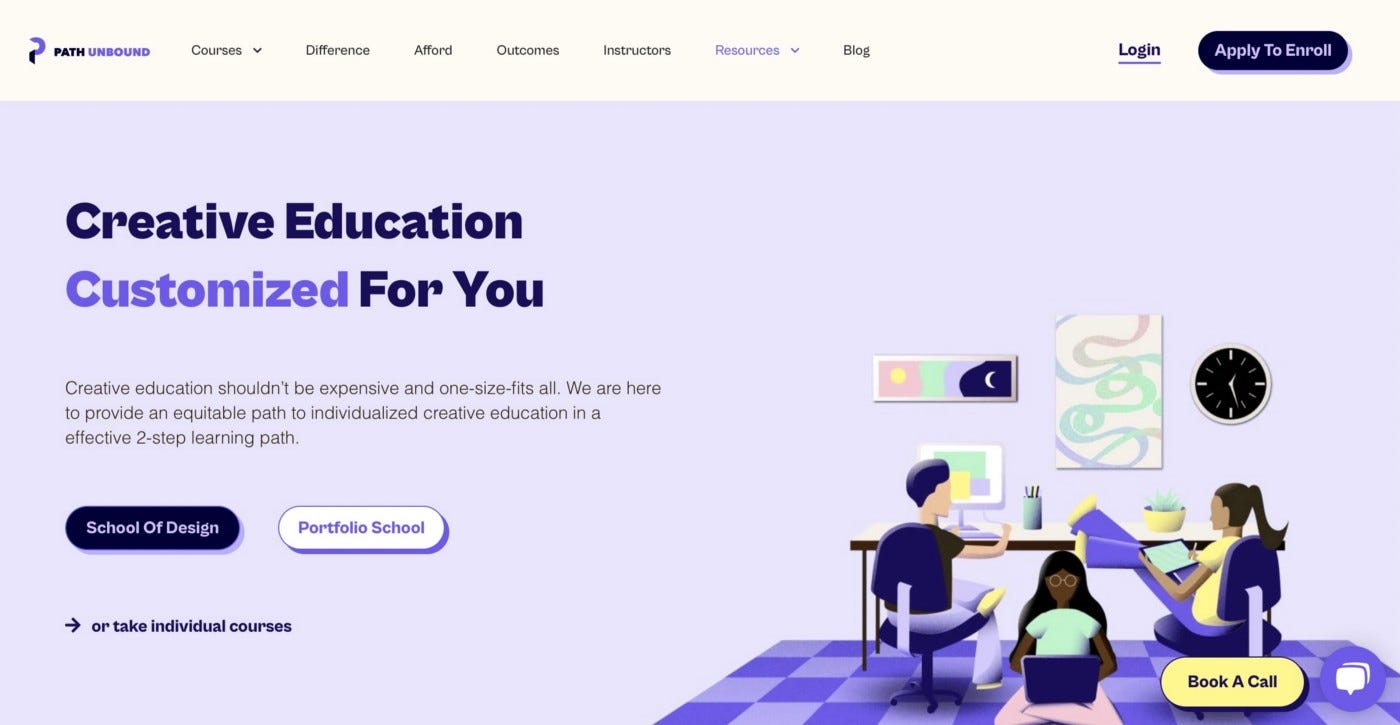
The program consists of 9 courses in color theory, typography, layout, UI design, design system, design accessibility, UI animation and interaction, branding and art direction.
The curriculum and study plan recommended for each student is different based on their existing background and diverse learning goals.
Students are able to build up to 9 portfolio projects and be paired with startups to receive real feedback for their design projects in the portfolio phase.
Unlike other design bootcamps that rely on outsourced mentoring, Path Unbound has a team of expert instructors who have proven to not only excel in what they do professionally but also experienced in instructions.
One thing to note is, Path Unbound is focused on UI and visual design rather than UX design, although the basic principles of UX is touched upon throughout the school’s course offerings.
Tuition Cost:
$4,380 (or lower depending on course load), or
$499 per course (if taking individual courses instead of certificate)
Financing Options:
Upfront, Deferred Tuition or Monthly Payment
Scholarships:
Ongoing 30% scholarships available with separate application — Apply Now!
Path Unbound Portfolio School
Path Unbound also offers a stand-alone Portfolio School program for students who have learned design elsewhere but lacking portfolio development or career advice.
There are 2 tracks designed for students who are at different stages of portfolio building.
The Portfolio Express track provides 6-weeks of intensive branding, custom portfolio website building, visual design and portfolio project refinement training for students who already have at least 2–3 existing projects but are lacking in “wow factors”.
The Portfolio Kickstart track provides 12-weeks of portfolio project building as well as branding, visual design and custom website building training for students who have gained design knowledge but do not yet have portfolio-level projects.
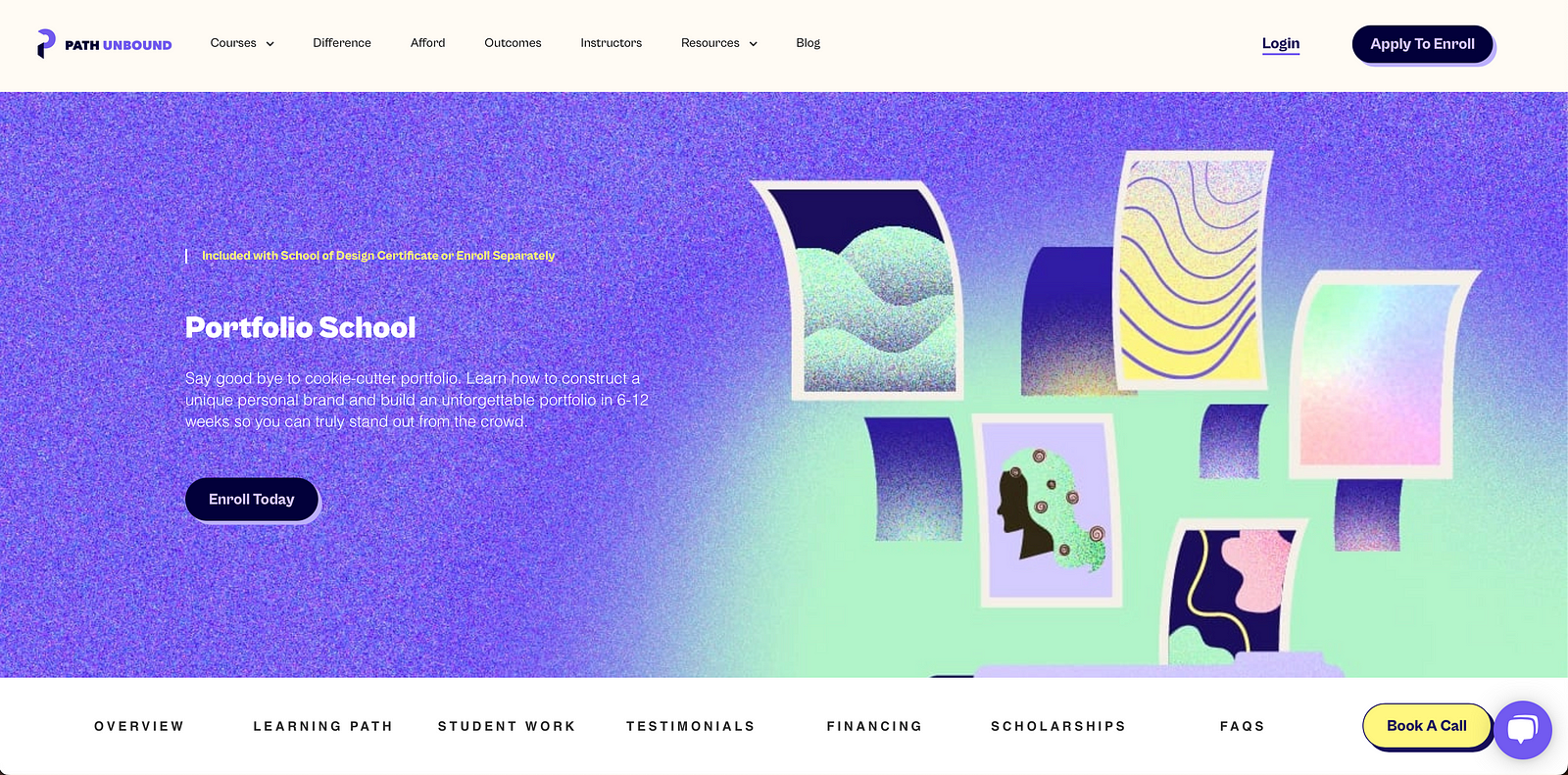
The Portfolio School program is included as part of the School of Design program for students who are enrolled to receive the certificate.
Tuition Cost:
Portfolio Express: $899 (6+weeks)
Portfolio Kickstart: $1,899 (12+weeks)
Financing Options:
Upfront, Deferred Tuition or Monthly Payment
Scholarships:
Ongoing 30% scholarships available with separate application — Apply Now!
RookieUp
RookieUp Build Your Portfolio bootcamp is a highly-customizable design bootcamp that pairs a student with a mentor who provides feedback for students as they build portfolio projects and prepare for job search.
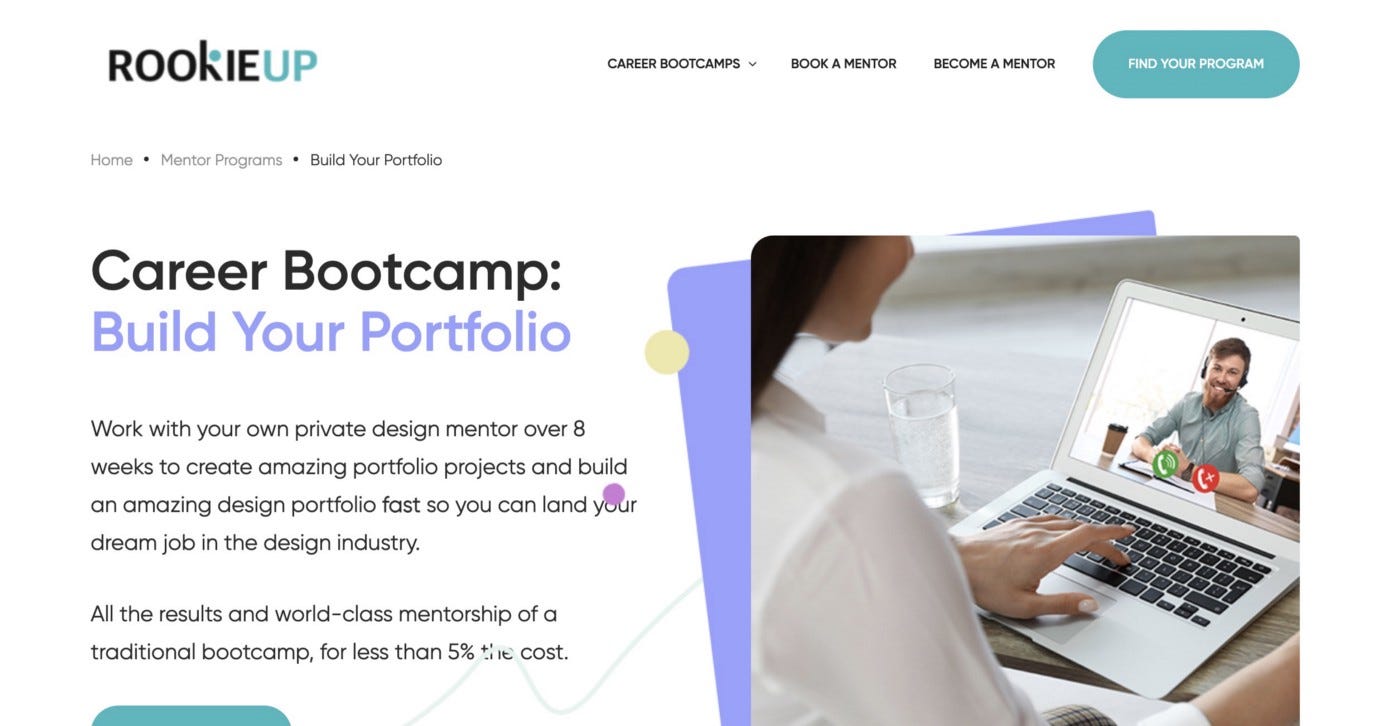
Based on the hours of video calls desired, students pay different tuitions for 4, 5 or 6 hours of total instructional time to review their portfolio projects.
The bootcamp also provides project prompts for students who do not already have ideas on what projects they want to work on for their portfolio.
Tuition Cost:
Learning: $599 (4 hours of video call)
Building: $699 (5 hours of video call)
Launching: $899 (6 hours of video call)
Financing Options:
Upfront
Scholarships:
Not available
SuperHi
SuperHi is an online design school that offers a wide variety of shorter courses in different disciplines. Students may choose the specific disciplines they are interested in, which essentially allows them to either fill in the blanks of what they are currently lacking or take one step at a time in exploring design as a career.
SuperHi offers some of the newest design courses in emerging areas such as Web3, Crypto, and AR design, which can be very interesting to established designers who want to expand their skillsets.
In comparison, Path Unbound also offers a similarly flexible approach for students who want to dip their toes into design without fully committing to a full learning program as each of the 9 courses in the School of Design program can also be taken separately.
For more dedicated students, SuperHi offers a membership program that allows students to access all of their courses, with limited career and mentor support compared to other programs.
It is more similar to the Coursera model where there are a collection of courses rather than a dedicated design bootcamp that aims to train students from beginning to end.
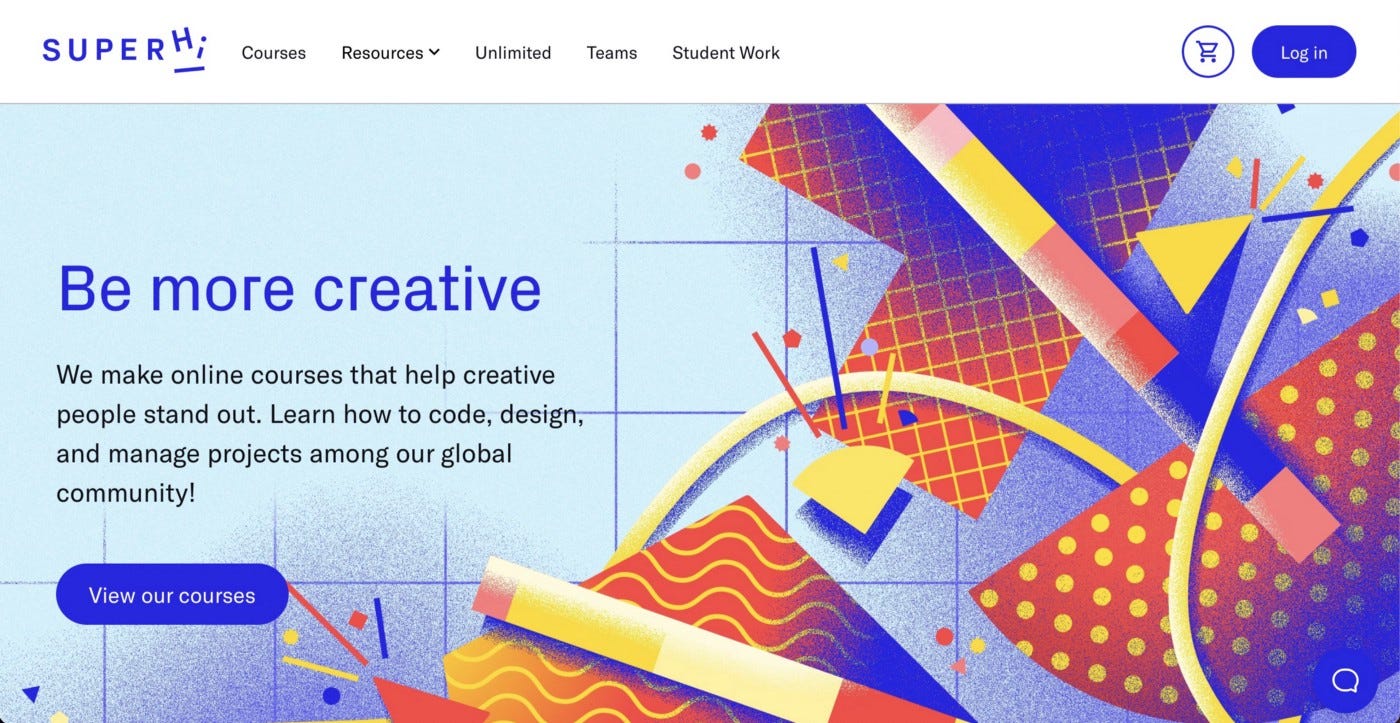
Tuition Cost:
$149-$499 per course with $360 annual subscription plan as an option
Financing Options:
Upfront
Scholarships:
No regular scholarship but periodic scholarships during Pride Month or Black History Month.
Interaction Design Foundation
Interaction Design Foundation focuses primarily on UX design with a wide variety of courses. All of their courses are self-paced. They do not run on a pay per course model or a cohort model. Instead, you will pick and choose any course you want, but you have to become a member with a monthly subscription.
The basic monthly subscription at $16/month only grants you access to the courses but without any instructions from a mentor or instructor. If you are willing to upgrade to the more expensive monthly subscription plan at $200/month, you will be able to speak to a “personal coach” about your design.
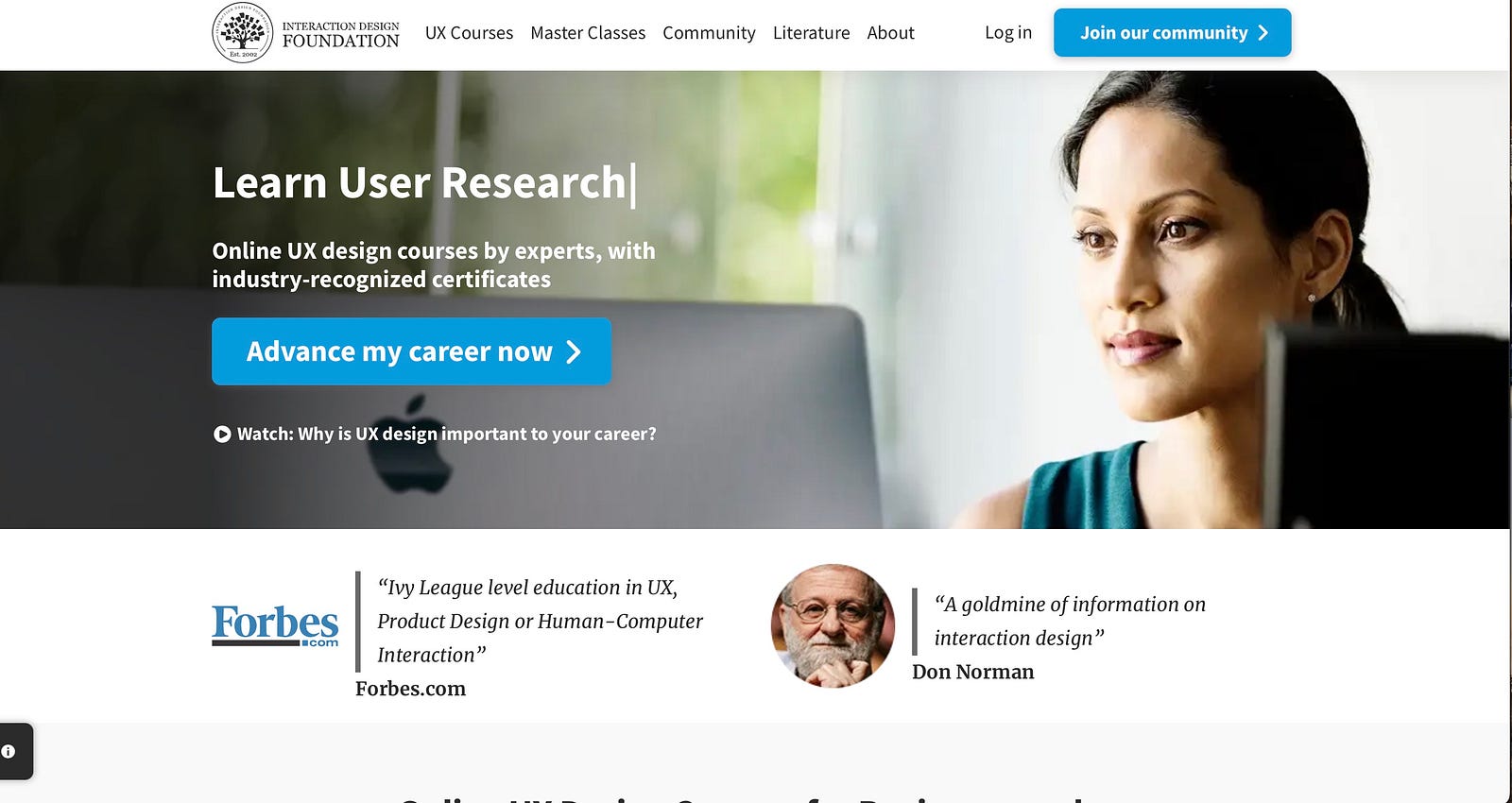
The IDF model works best for students who are primarily interested in UX design and not visual, UI or branding. It also requires the student to piece together different courses that they might need and find missing information elsewhere if it is not covered in the courses.
It is great for students to dip their toe in UX design a little bit before committing to longer, more structured design bootcamps.
Tuition Cost:
$16/month for access to courses without mentorship or instructions or
$200/month for access to courses and personal coach
Financing Options:
Upfront
Scholarships:
No regular scholarship
Memorisely
Memorisely is a design bootcamp that runs on the live online class model. It is great for students who have time in their schedule to set aside a set time each week for consecutive weeks to study design. It is also great if students enjoy learning with others.
The curriculum isn’t exactly customizable, but it is well structured and well loved by students, as seen through student testimonials.
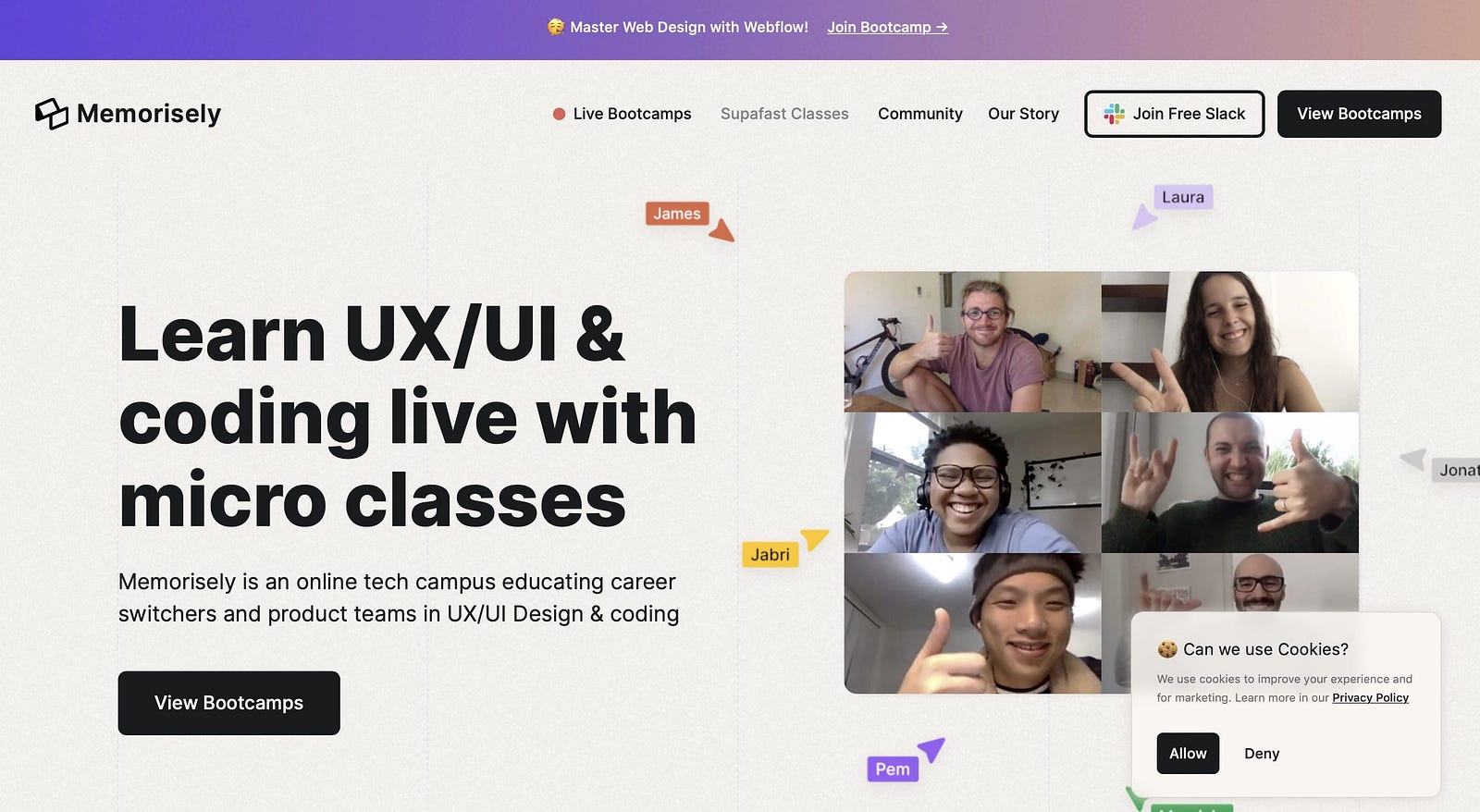
Tuition Cost:
$2,150
Financing Options:
Upfront or Monthly Payment
Scholarships:
No regular scholarship
You may have noticed that we did not include some of the more “well-known” bootcamps in this list because their tuition is much higher and therefore does not meet our definition of being affordable.
We made a point to include only the ones that are well-designed, well-structured, with flexible options and more reasonably-priced than the bigger players, in hopes to provide a great list of resources for those who are looking to start their design careers without spending a fortune.
Do you know of any other programs we should include? We are always open for new ideas and tips.





